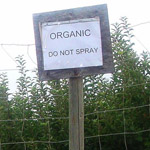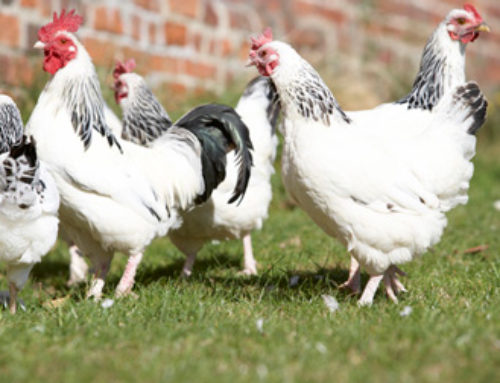
Business Wire, 16 Sept 2011.
Rodale Institute today announces the latest results of the Farming Systems Trial, America's longest running side-by-side comparison of organic and conventional farming practices. Originally created to study the transition from conventional to organic production, this 30-year study also examined productivity, soil quality, energy and economics.
Key findings show:
- Organic yields match or surpass conventional yields.
- Organic yields outperform conventional yields in years of drought.
- Organic farming systems build rather than deplete soil organic matter, making it a more sustainable system.
- Organic farming uses 45 percent less energy and is more efficient.
- Conventional agricultural systems produce 40 percent more greenhouse gases.
- Organic farming systems are more profitable than conventional farming systems.
After 30 years of a rigorous side-by-side comparison, the Rodale Institute confidently concludes that organic methods are improving the quality of our food, the health of our soils and water, and the conditions of our nation's rural areas. Organic agriculture creates more jobs, provides a livable income for farmers, and can restore America's confidence in our farming community and food system.
"America's farming techniques affect the health of our families, our communities, and our planet. The Farming Systems Trial shows that organic farming is the healthiest and safest way to feed the world, provide much-needed jobs, reduce our greenhouse gas emissions and protect precious natural resources," says Mark "Coach" Smallwood, Executive Director of Rodale Institute.
"The Farming Systems Trial clearly documents in a replicated, scientific fashion, that many of the current myths are not true. Organic agriculture does not result in the grower losing money, does not result in lower yields, or more expensive management practices," says Dr. Elaine Ingham, Chief Scientist at Rodale Institute. "The next step forward is to educate growers, whether they are conventional or organic, in the methods used in the Farming Systems Trial to assure equal or better yields through farming practices that do not harm the environment."
The trial is slated to continue with a new focus on nutrition and human health. "We have shown that organic can feed the world. Now it is time to take on the matter of feeding the world well," said Smallwood.
Rodale Institute will celebrate the 30th year of this landmark trial on Friday, September 16th with the first Organic Pioneers Award dinner, honoring Drew and Joan Norman of One Straw Farm, Maurice Small, youth organizer and Dr. Richard Harwood, former Director of the Rodale Research Center and invaluable contributor to the Farming System's Trial.
For more information on the results, including detailed findings and graphs, please visit www.rodaleinstitute.org/fst.
Rodale Institute is a 501(c)(3) nonprofit dedicated to pioneering organic farming through research and outreach. Celebrating its 30th anniversary in the fall of 2011, the Institute's landmark Farming Systems Trial is America's longest running side-by-side comparison of organic and conventional agriculture. For over sixty-years, the Institute has been committed to researching the best practices for organic farming and sharing findings with farmers and scientists around the world, advocating for policies that support farmers, and educating consumers about how going organic is the healthiest option for people and the planet.
SOURCE: Rodale Institute, maya.rodale@rodaleinstitute.org





If this study is true then, why is every organic field that I have ever seen, so poor yielding? Both in Australian unfertile soils and in Canada in more fertile soils. Also, why have so many organic farmers gone broke in Australia. Almost every conventional farmer has seen every organic farmer get out of farming within 10 years of going organic. So how can these observations be reconciled with this study. Also, in Western Australia, tillage that is used to kill weeds in organic farming, this causes severe soil erosion. Such soil loss is not sustainable – do you have any suggestions or are my observations unusual.
Bill, these are good points. While I’m not a farmer, I know farmers, including organic ones, and former farmers who’ve given up. In every case, and I can only speak for Europe, the reasons why the farmers had to give up were not because of yield or poor soil but because of political and economic conditions. Two farmers got screwed by supermarkets who contracted with the farmers to supply a massive crop and later reduced the price paid to the farmer to below cost of production. One former organic dairy farmer couldn’t carry on because supermarkets are buying cheaper organic milk from other EU countries and he was expected to sell his milk below cost of production.
In many EU countries, massive government subsidies favour conventional monocrop farmers but many organic farmers are not eligible for any handouts, even in the expensive transition phase. So it’s not a level playing field and economic factors, not yield, are the deciding element.
Regarding yield, while the Rodale trials show organic yields can be as good as or superior to conventional, while preserving soil for the future, this isn’t every farmer’s experience. The Rodale is very good at organic farming and has had years to get it right.
We also have to bear in mind that organic growers often don’t grow to maximise yield of one crop–many grow several crops per year instead of a single crop, and underplant or intercrop with the main crops.
Tillage is just one factor to consider among many, and no-till techniques aren’t restricted to conventional or GM farming–they’ve been practised by organic and permaculture growers for years. Certainly herbicides don’t seem to be a sustainable method of weed control, as they just lead to superweed problems. Interestingly the use of herbicides to control weeds in GM crop fields has now forced farmers back to the stone age, pulling weeds by hand.
There’s no magic solution to the ag crisis, but what’s pretty certain is that GM crops aren’t it, and that industry, farmers, consumers and politicians need to unite to create a better form of agriculture that will preserve and build soil and produce healthy food sustainably.
The global figures for organic farming show no drop in overall area of organic farming, and continuing growth in Europe, despite the global recession.Organic sales are growing in double figures in all the main EU markets (the UK is the one exception due in part to the attitudes of a few large supermarkets). The largest organic market in the world, the USA, is also growing strongly. All long-term comparative trials of organic compared to non-organic (Rodale is one of several around the world) show higher levels of soil organic matter in organic systems, because of more mixed farming (crops and livestock), greater returns to the soil of crop residues and denser and deeper root systems, more permanent or temporary grazing land, and other factors inherent in organic systems. For 60 years Western farming has measured success in terms of yield (tonnes) of crop per hectre or acre, regardless of the inputs required to secure that yield. Now we are starting to consider the quantity of fossil fuels (used for manufactured fertilisers and pesticides), and mined inputs like phosphates – all heavily used in non-organic farming – that are needed to produce high yields. Neither fossil fuels nor phosphates are inexhaustible, and increases in costs of fertilisers to farmers reflect their increased scarcity. The problems of water scarcity in many countries, and the huge dependence of much intensive farming on irrigation, is also unsustainable. To feed the world in future we need farming systems that do not rely on increasing quatities of inputs that are running out and increasing in cost. We will all also need to eat more seasonal, locally sourced, organic diets, with – for those of us in the West and North – less but better quality meat and dairy products. We have to stop or drastically reduce the wasteful practice of feeding grains and protein to cattle, and focus on grass fed beef and lamb instead.